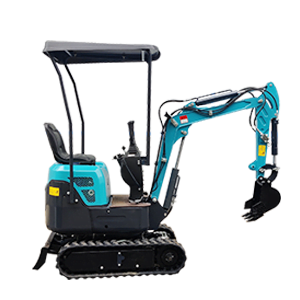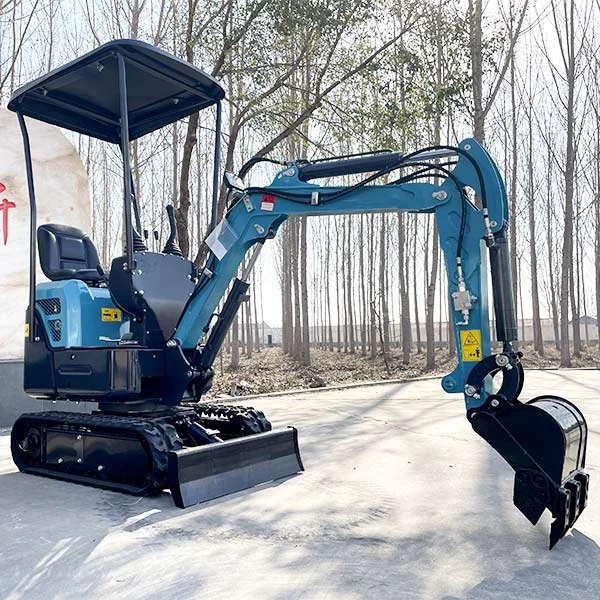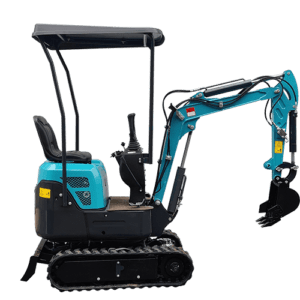E-mail: [email protected] WhatsApp: 8618266768780
Comment choisir la bonne excavatrice de 1 tonne pour vos besoins
Introduction
Choosing the right 1 ton excavator for your needs is a critical decision that can significantly impact the efficiency and success of your construction or landscaping projects. These compact machines are essential for small-scale excavation tasks, offering the perfect balance between power, size, and maneuverability. In this comprehensive guide, we will explore the key factors to consider when selecting a 1 ton excavator, the advantages they offer, and provide a detailed comparison of popular models. Whether you are a contractor, landscaper, or a DIY enthusiast, this guide will help you make an informed choice.
Understanding 1 Ton Excavators

What is a 1 Ton Excavator?
A 1 ton excavator, also known as a mini or compact excavator, is a small excavator that typically weighs around 2,200 pounds (1 ton). These machines are designed for precision work in tight spaces where larger excavators cannot operate efficiently. Despite their small size, 1 ton excavators are powerful and versatile, capable of performing tasks such as digging, trenching, grading, and light demolition.
Advantages of 1 Ton Excavators
- Maniabilité: Ideal for navigating confined spaces and urban environments.
- Transportabilité : Easy to transport on a trailer or small truck.
- Efficacité: Suitable for a variety of tasks, enhancing productivity on small projects.
- Lower Operating Costs: Reduced fuel consumption and maintenance costs compared to larger excavators.
- Polyvalence: Compatible with various attachments such as buckets, augers, and breakers.
Key Considerations for Choosing a 1 Ton Excavator
1. Exigences du projet
Assess the specific needs of your project. Consider factors such as the type of terrain, the nature of the tasks, and the space constraints. Ensure that the 1 ton excavator you choose can handle the job effectively.
2. Size and Weight
While all 1 ton excavators are compact, slight variations in size and weight can affect maneuverability and transportability. Ensure the dimensions and weight of the excavator fit your project requirements and transportation means.
3. Power and Performance
Evaluate the engine power and hydraulic performance. Higher power ensures better digging capabilities and smoother operation. Look for models with efficient engines that provide the necessary power without excessive fuel consumption.
4. Accessoires et polyvalence
Consider the types of attachments that the 1 ton excavator can accommodate. The ability to use different attachments enhances the machine’s versatility, allowing you to perform a variety of tasks with a single machine.
5. Ease of Operation and Comfort
Operator comfort and ease of use are crucial for productivity. Look for features such as ergonomic controls, adjustable seats, and user-friendly interfaces. Some models may also offer advanced features like digital displays and automated functions.
Comparison between 1 ton excavator and other excavators
Here’s a comparative table highlighting the key differences between 1 ton excavators and other types of excavators, such as 3-ton, 5-ton, and 10-ton excavators, to emphasize the unique characteristics and advantages of 1 ton excavators.
| Fonctionnalité | 1 Ton Excavator | Excavatrice de 3 tonnes | Excavatrice de 5 tonnes | Excavatrice de 10 tonnes |
|---|---|---|---|---|
| Poids opérationnel | ~2,200 lbs (1 ton) | ~6,600 lbs (3 tons) | ~11,000 lbs (5 tons) | ~22,000 lbs (10 tons) |
| Puissance du moteur (HP) | 10-15 HP | 20-30 CV | 40-60 CV | 80-120 HP |
| Profondeur de creusement maximale | 5-7 ft | 8 à 10 pieds | 11-13 ft | 15-18 ft |
| Bucket Capacity (cu yd) | 0.01-0.03 cu yd | 0.05-0.1 cu yd | 0.1-0.2 cu yd | 0.3-0.5 cu yd |
| Travel Speed (mph) | 1.0-2.5 mph | 2.0-3.0 mph | 2.5-3.5 mph | 3.0-4.5 mph |
| Transportabilité | Easy to transport on small trailers | Requires larger trailers or trucks | Requires heavy-duty trailers | Requires specialized transport |
| Maniabilité | Excellent for tight spaces | Good for medium spaces | Fair in open spaces | Limited to large open spaces |
| Applications typiques | Landscaping, small construction, DIY | Residential construction, utilities | Mid-sized construction, road work | Large construction, heavy excavation |
| Coûts d'exploitation | Low fuel and maintenance costs | Moderate fuel and maintenance costs | Coûts de carburant et d'entretien plus élevés | High fuel and maintenance costs |
| Polyvalence | Highly versatile with various attachments | Versatile with moderate range of attachments | Versatile with a wide range of attachments | Versatile with high capacity attachments |
| Coût initial | $20,000 – $35,000 | $40,000 – $60,000 | $60,000 – $80,000 | $100,000 – $150,000 |
| Facilité d'utilisation | Very user-friendly, simple controls | User-friendly | Requires moderate skill | Requires high skill |
| Impact environnemental | Low ground impact, low emissions | Moderate ground impact and emissions | Higher ground impact and emissions | High ground impact and emissions |
| Entretien | Simple, easy access to service points | Moderate complexity | Plus complexe | Very complex, frequent servicing needed |
| Sécurité des opérateurs | Good safety features, less risky | Good safety features | Comprehensive safety features | Extensive safety features |
Additional Features to Consider

La consommation de carburant
Fuel-efficient models can significantly
reduce operating costs and environmental impact. Look for excavators with advanced engine technology that maximizes fuel efficiency without sacrificing power.
Entretien et facilité d'entretien
Consider the ease of maintenance and availability of parts. A model with easy access to service points and a good support network from the manufacturer can save time and reduce downtime.
Sécurité des opérateurs
Safety features are crucial for protecting the operator and ensuring smooth operation. Look for features such as ROPS (Roll Over Protective Structure), FOPS (Falling Object Protective Structure), and seat belts. Some models also offer additional safety systems like overload warning indicators and anti-slip steps.
Confort et Ergonomie
Operator comfort can enhance productivity, especially during long working hours. Features like adjustable seats, ergonomic controls, air conditioning, and low noise levels contribute to a more comfortable working environment.
Technologie avancée
Some modern 1 ton excavators come equipped with advanced technology such as GPS, telematics, and automation systems. These features can improve accuracy, track performance, and simplify machine management.
Conclusion
Choosing the right 1 ton pelle requires careful consideration of your project requirements, budget, and the specific features of various models. By understanding the key factors such as size, power, attachments, ease of operation, and additional features, you can select a machine that will enhance your productivity and efficiency.
Whether you need an excavator for landscaping, small construction projects, or utility work, the right 1 ton excavator can make a significant difference. Evaluate your needs, compare the models, and choose the excavator that best fits your requirements to ensure successful project completion.
FAQ
What is a 1 ton excavator used for?
A 1 ton excavator is used for a variety of tasks including digging, trenching, grading, and light demolition. It is ideal for small-scale projects, landscaping, and working in confined spaces.
How do I choose the right 1 ton excavator?
To choose the right 1 ton excavator, consider factors such as your project requirements, the size and weight of the machine, engine power, available attachments, ease of operation, and additional features like fuel efficiency and safety systems.
What are the benefits of using a 1 ton excavator?
The benefits of using a 1 ton excavator include high maneuverability, ease of transport, efficiency in small spaces, lower operating costs, and versatility in handling various tasks with different attachments.
How much does a 1 ton excavator cost?
The cost of a 1 ton excavator varies depending on the brand, model, and features. Generally, prices range from $20,000 to $35,000. Additional costs may include attachments, maintenance, and transportation.
What attachments are compatible with a 1 ton excavator?
A 1 ton excavator can be equipped with various attachments such as buckets, augers, breakers, grapples, and trenchers. The compatibility of attachments depends on the model and the specific task requirements.
How do I maintain a 1 ton excavator?
Maintaining a 1 ton excavator involves regular checks and servicing of the engine, hydraulics, and electrical systems. Follow the manufacturer’s maintenance schedule, keep the machine clean, check fluid levels, and replace worn parts promptly. Regular inspections and proper storage can extend the lifespan of your excavator.
À propos de nous
Shandong Qilu Industrial Co., Ltd. est un fabricant et exportateur professionnel intégrant le développement et la production d'excavatrices, de chargeurs et de tracteurs. Nous fournissons le meilleur service, absolument.
Messages récents
Démo vidéo
-1.png)
Contactez-nous aujourd'hui !
Une question, un devis ou une demande ? Cliquez sur le bouton pour envoyer le message.
Qilu Industrial sera toujours là pour vous aider.

